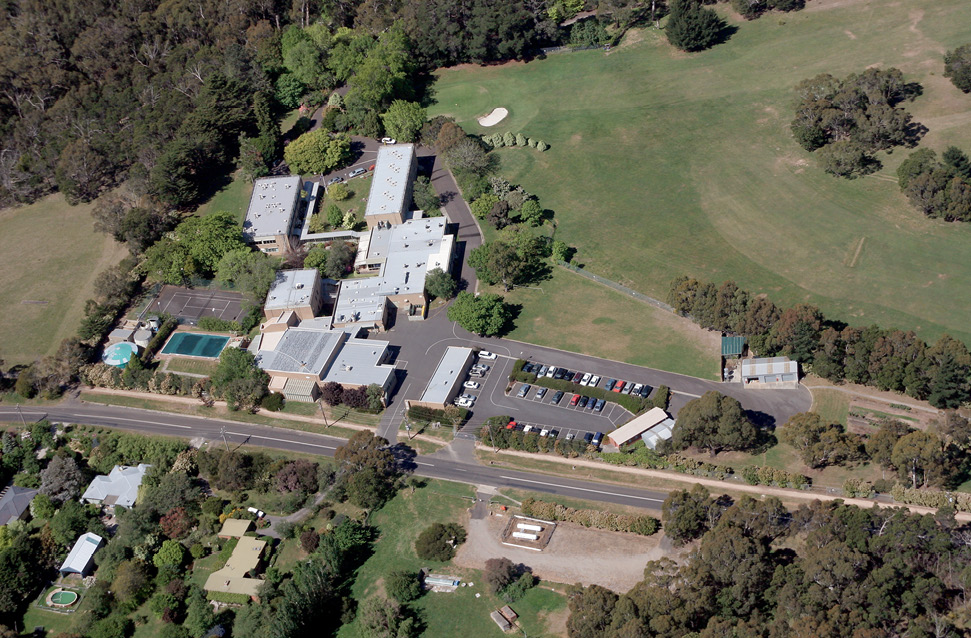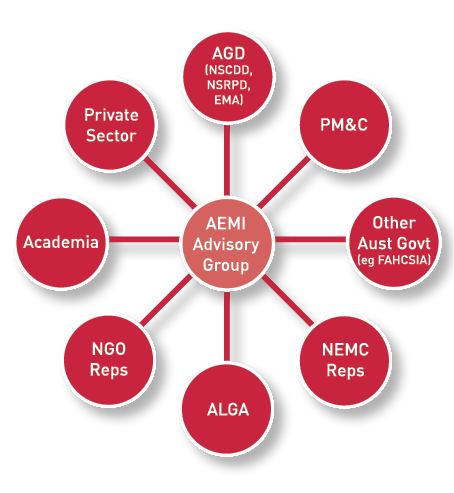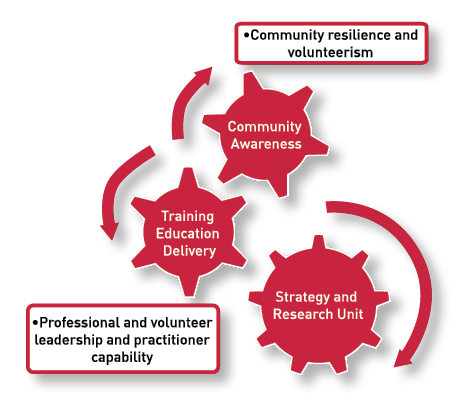
The Australian Emergency Management Institute (AEMI) Victoria has been playing an important role in the national emergency management landscape for over five decades. The AEMI has deserved its time-honoured reputation as Australia’s premier emergency management education and knowledge facility.

Aerial photo of the Australian Emergency Management Institute at Mount Macedon, Victoria.
When the Institute commenced in 1956 as the Australian Civil Defence School, its role was to provide training that offered maximum protection from the effects of hostilities on Australian soil. Under a new name, the Australian Counter Disaster College, the mid 60s saw the role of the Institute also change to reflect the evolving need to provide education that helped mitigate, minimise or alleviate human suffering in the event of a natural disaster. In the late 90s the philosophy of the organisation was extended beyond just natural disasters and began to encompass technological and human-caused disasters—addressing issues such as Y2K and the return to earth of the MIR space station. To reflect a transfer of departmental ownership, the Institute again changed its name to the Emergency Management Australia Institute, also bringing about a change in philosophy—to develop preparedness, prevention, effective response and speedy recovery from emergencies and subsequently, the more embracing creating safer, sustainable communities. These days, to reflect a more integrated national security approach, the Institute has adopted a name that not only announces a new era but also heralds its transformation into a centre of excellence for knowledge and skills development for the emergency management sector, supporting broader national security capability.
All organisations must undergo changes to ensure they remain forward-looking, innovative and connected. To this end the Attorney-General’s Department has developed a new strategic vision for AEMI (the Way Forward). The vision sets out a challenge for the Institute to become a centre of excellence by focusing on delivery of products which are:
As part of the overarching Attorney-General’s Department strategy for achieving a secure society, the Way Forward aims to ensure AEMI provides strategically-aligned research, training, education and development activities that will assist in building the capabilities of its key stakeholders in preparing for, preventing, responding to, and recovering from significant disaster events.
The new AEMI will focus on continuous improvement and client orientated performance to ensure value to Government and the national security arrangements.
Continuing its operations from Mt Macedon, the organisation’s focal point will of course remain education & training and community awareness. However, the vision for AEMI is that the organisation will take on a much deeper and more strategic role in national security. The Institute will develop into a comprehensive centre of excellence for knowledge and skills development for the sector.
AEMI will deliver national knowledge and skills development activities that build:
The four corporate goals in the Way Forward strategy are that AEMI will:
To achieve these goals, a restructure and alignment of resources has occurred.
The new structure will foster a close working relationship between AEMI and other business units within the Attorney-General’s Department including the National Security Resilience Policy Division (NSRPD) and Emergency Management Australia Division (EMA); and Prime Minister and Cabinet (PM&C).
A newly-established AEMI Board will ensure, among other things, that the activities of AEMI are aligned with and complement current national security policy capability and operations directions. The Board is comprised of:
Chaired by a Board member (the First Assistant Secretary, National Security Capability Development Division), an AEMI Advisory Group (AAG) comprising representatives from a wide range of key stakeholders, including representatives from states and territories, has been convened. This group will meet every six months and provide an important consultative mechanism for the Board deliberations, in particular identification and endorsement of key AEMI activities and deliverables and the monitoring of performance.
Figure 1. Composition of the AEMI Advisory Group.

A Strategy and Research Unit will play a pivotal lead role in the operational model for AEMI. This business unit will engage with a wide array of interested parties to identify and canvass significant issues for knowledge and skills development within the emergency management environment. It will also drive the development and implementation of a research agenda (in partnership with other Government agencies, academic partners, jurisdictions, NGOs and the private sector). The Unit will also be responsible for establishing an effective ‘lessons learned’ function—in partnership with the Counter-Terrorism Capability Development Branch of the Attorney-General’s Department.
The research agenda will be important to informing engagement on forward-looking capability and resilience policy matters; the design of strategic workshops and forums to generate insight and actions on significant matters which impact resilience and capability and the development of emergency management.
The research and thinking of the AEMI will be focused on the practical application to emergency management skills, capability development and community resilience. It will include an emphasis on servicing the needs of emergency management volunteers.
The Strategy and Research Unit will also identify suitable secondment opportunities between AEMI and other key stakeholders—including fellowship opportunities from within the tertiary sector.
Strategic insight emanating from each unit will inform the development of training and education products that can effectively address significant emerging issues or gaps and the design of community engagement activities. This will help build national disaster resilience and support the volunteer effort in an ageing Australian population (recruitment, retention and opportunities for development).
Proposals for training and education to be provided under a fee-for-service arrangement and charging regime, are also under consideration. The fee structure and charging regime proposals will be consistent with Government’s competitive neutrality and cost recovery policies and will reflect the Attorney-General’s Department’s acceptance of certain ‘community service level’ obligations for particular stakeholder groups, including volunteers.
Four business units have been established to manage the responsibilities of AEMI:
These units will be directed by the First Assistant Secretary of the AGD National Security Capability Development Division and the Executive Director of the AEMI.
Figure 2. Business units

Table 1. Roles and responsibilities of each new Business Unit
Business Unit |
Areas of Responsibility |
|---|---|
Strategy & Research |
Strategic activities to further the debate to inform direction on emerging issues of national importance through:
Managing a Research Agenda focused on contemporary issues in emergency management which will:
|
Training & Education Delivery |
Design and delivery of professional and volunteer focused training and education products which meet the highest needs of stakeholders. Products will take the form of Mt Macedon based, off-site and on-line delivery of:
Exploitation of ICT opportunities in the effective delivery of training, education and delivery. |
Community Awareness and Education |
Community Engagement and EM library services to build understanding, awareness and resilience, with a focus on:
Supporting the volunteer sector by stimulating community understanding of volunteering and recruitment and retention of volunteers – including in Culturally and Linguistically Diverse communities Exploitation of ICT opportunities in the delivery of community awareness activities. |
Business Support |
|
The past half century has seen an exponential growth in the challenges faced to develop a disaster resilient Australia and therefore the services offered through AEMI. Its continuing work to research future directions in emergency management and to position emergency managers to deal with yet unseen challenges will assist the sector to continue to meet its responsibilities and to assure the safety of all communities in Australia.
Further information about the Institute and its current activities is located at the Emergency Management in Australia website at www.em.gov.au/aemi.